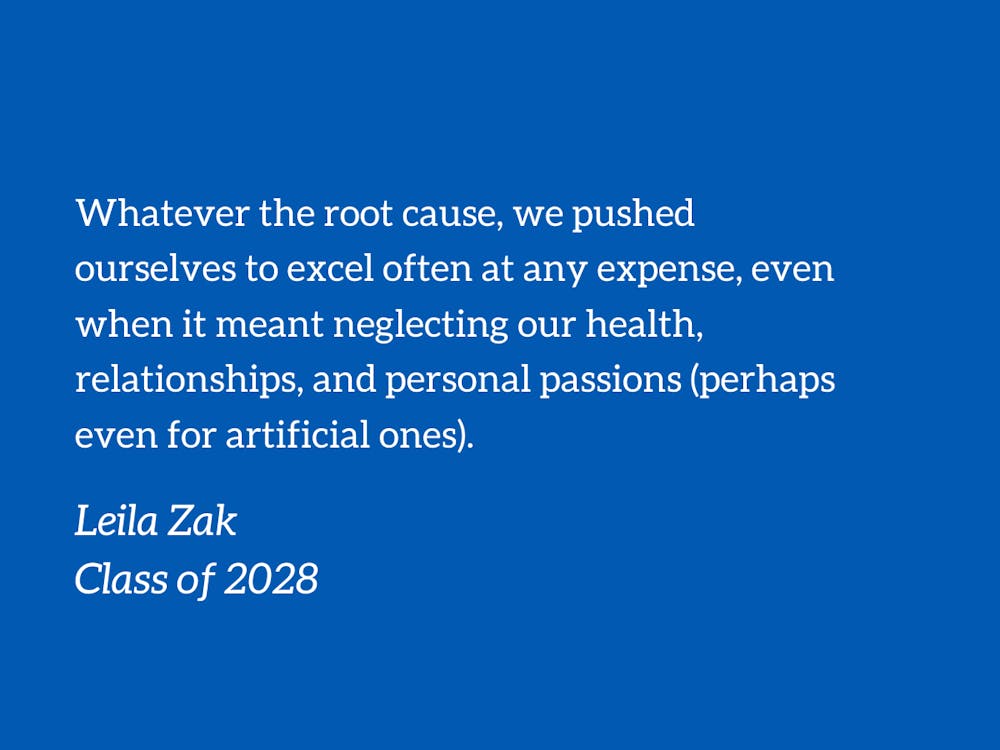"I guess everyone here is kind of messed up."
At least — that was the consensus we shared at 2 a.m., on the floor, in our three-person circle at the end of the hall. We had made our ascent from a series of confessions, having divulged to one another some of the most turbulent, formative histories that had shaped us (kicking and screaming) into our present-day selves. It brought us closer together, in a sense. We could not have fully known each other until we knew this: where we came from, in all our dimensions and tragic glory.
What we meant to say with this conclusion, though, was that everyone at Duke has likely come from a similar, high-pressure background. We sport an aversion to failure yet hold ourselves to impossible standards. Sacrifice is just another prerequisite to the concept of "success" after which we chase so furiously. Without sacrifice, we would not be at Duke. And without Duke, without the titles, credentials and group-affiliations we’ve amassed, who would we be? How else might we define ourselves?
We’ve become so used to introducing ourselves with one of our titles in particular: our majors. We are pre-med, pre-law, English majors, engineering students — defined by a tentative future instead of the qualities we project definitively in the present. From an early age, many of us learned to tether our worth to our strengths and achievements, placing value not on who we were, but rather on what we could do best. Failure, as we understood it, was not an option.
Before Duke, some of us may have navigated a rockier road. Validation in a school setting may have served as a substitute for the security we sought from family, friends or significant others. Theory and numbers were not nearly as volatile as life could be in the outside world.
In school, there was a clear-cut rubric to success, and this calculable route toward validation could work as a source of stability amid an otherwise chaotic life. If we could not derive fulfillment from other areas, at least we knew we could achieve well in the classroom. For some, it was more comfortable, more predictable than home could oftentimes be. It is much simpler to learn about addiction, abuse, or assault in an academic setting, for instance, than it is to experience it first-hand in the flesh.
Whatever the root cause, we pushed ourselves to excel often at any expense, even when it meant neglecting our health, relationships and personal passions (perhaps even for artificial ones). Whether it was driven by financial necessity or simply our own self-made monstrosity, we placed extraordinary pressure on ourselves to get to where we are today. And we were rewarded for it. We felt in control. We received affirmation and admiration alike for engaging this vicious cycle.
In the media particularly, youth are celebrated for their displays of superlative talent. It is always impressive when children bear skills and mindsets that exceed the perceived confines of their years. What’s paradoxical about this, though, is that young people are so often lauded in the public eye for taking on the most pressing issues of today, but are at the same time underlooked in the professional world on the basis of their age. They are undermined in the workplace, but are expected to have the capacity to tackle global, system-spanning challenges all on their own accord.
In a dim and anarchic world, youth inspire hope as "changemakers" and the "leaders of tomorrow." Instead of taking place and precedence in the present, progress is deferred to future leaders, future generations. And while many young people are invariably committed to and find value in the work they do, the real issue is, at its core, systematic. It begs the question — why should the responsibility to create lasting, collective change lie on the shoulders of students and not on those at the helm of global governance? Why are our youth working against a system that is actively working against them?
There is this sense of "if they won’t do it, I will." Many of us are forced to mature early by the displays of iniquity we witness either around us, directed toward us, or in the media. Disillusioned by the world we inhabit, we are prompted to be agents of change, to seek out reform in any way we can. We are pressured to carry the weight of the future, but in thrusting these enormous expectations onto ourselves — similar to the case of academic pressure — we miss out on the proper childhood we could have lived.
In both of these cases, we are forced into adult shoes at a premature age. And by consequence, we are denied the time and space we need to be immature, to make mistakes and learn from them, to grow, to have real, unfettered fun — to truly be children at all. All the while, the expectations both we and society demand of ourselves continue to tower ever-higher over us. And when it’s all too much, we will have two options: either continue enduring this hell we’ve created for ourselves, or topple. Either way, we are the ones who will have to bear the brunt of it.
Leila Zak is a Trinity first-year.
Get The Chronicle straight to your inbox
Sign up for our weekly newsletter. Cancel at any time.

